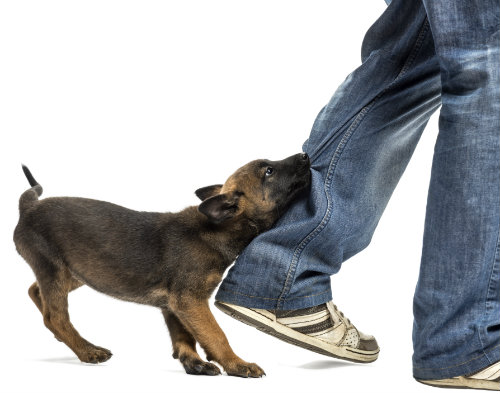If you've just brought home a new puppy you should find these tips on how to stop a puppy from biting and chewing very handy.

Puppies are similar to human babies. As a puppy grows he starts to teethe, and in an effort to relieve any discomfort this causes, he will chew on anything that's hard.
Unfortunately, this includes your hands and feet, your furniture, your shoes, pens, and other objects. But, not only is your puppy's biting behavior costly to you, and painful as his teeth get sharper, it can be a hazard to his own health.
Too often young puppies end up at the vet with bowel obstructions after swallowing large and indigestible objects.
Keeping plenty of dog toys around will help to keep your puppy busy. They'll stop him from getting bored and searching for objects to chew that could cause him harm. Some dog toys can be pricey, but if good quality, they should last a long time. Plus, spending a bit of money on some chewy toys now could save you a very hefty vet bill later on down the track, and your puppy a lot of pain.
How To Stop Your Puppy From Biting You
If your puppy is sitting with you and you are not patting him or playing with him and he tries to bite or lick your hand keep your hand still. Don't move it away quickly as he might grab your hand and bite you.
If he does bite you, say ouch out loud, then walk away and ignore him. This will stop the bite so you don't have to pull your hand out of his mouth and sends a clear message that you do not like being bitten.
Make sure all family members do the same. If he is allowed to bite some people some of the time, it will take much longer for him to learn that biting is not acceptable behavior.
Puppy Proof Your Home
Puppies love to chew on wood. You can't remove all your wooden furniture, but you can puppy proof your home in other ways
- Keep all wires hidden, or invest in rubber-like tubular wrapping designed specifically for wires.
- Put all of your shoes in your closet and keep all closet doors closed.
- If you have children make sure your puppy stays out of their bedrooms or anywhere they might have much loved toys lying around.
- Keep a tight lid on the bin or put it somewhere so the puppy can't get to it, knock it over, and eat something like plastic wrappers or cooked bones.
- Make sure your indoor plants are not poisonous to dogs. If any of them are put them somewhere out of reach or replace them with plants that are not toxic. Click here for the ASPCAs list of plants that are toxic to animals.
Crate Him When You Can't Watch Him
It's advisable to crate your puppy when you can't keep constant watch over him, or supervise him closely. If you can't afford a crate, designate an area in a room for him and block it off with a gate.
The area should be free of all chewable objects, other than his toys. On one end, leave his food bowl and water bowl. Place his favourite toys in another corner. In another section, put his bedding. Your puppy needs to be contained during the first few months until he is properly trained. Of course, take him out of his area or crate whenever you can, but absolutely do not let him out of your sight.
Give Him Ice Cubes
Chewing on something cold and hard will put your puppy in heaven. There are also dog toys you can fill with meat or peanut butter that can be given frozen as well.
The advantage of having freezable dog toys is that there's not that sloppy, watery mess you get when you feed him ice cubes.
Still, ice cubes are a huge hit with teething puppies and great on hot days.
Also, remember to give your puppy several small meals a day as he will tend to chew on objects more or bite your hands if he's hungry.
